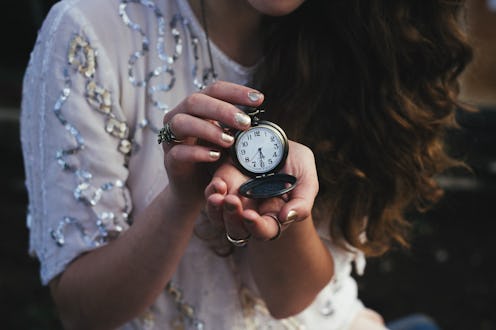Life
What Perpetually Early People Have In Common

Some people are basically always early, and others are always late. And the one thing perpetually early people have in common is a little counter-intuitive — they're basically pessimists. What does pessimism have to do the getting somewhere in a timely fashion? As it turns out, quite a lot. And we have psychologists to thank for explaining this one.
The "planning fallacy" is a cognitive bias first named and identified by legendary psychologists Daniel Kahneman and Amos Tversky. Through experiments, Kahneman, Tversky, and subsequent other researchers confirmed that humans are extremely bad at estimating how long tasks will take. In particular, people hugely under estimate time to completion for their own tasks — even when they've done similar tasks (and made similar errors) repeatedly in the past. The planning fallacy may be so strong that people unwittingly substitute their "best case" estimate for how long things will take for their actual estimate. But we all know that the "best case" rarely actually happens.
This planning fallacy explains why you load your to-do list app with 10 items for today, when you've never in the history of your smartphone finished more than three. It explains why you think you'll be able to swing by home and take a quick shower before meeting your friends in an hour, 10 miles away. And it explains why you leave only 20 minutes to get to that date that's at a bar that's taken you from 20 to 50 minutes to get to in the past. You've focused on the optimistic assessment of the situation, and ignored the pessimistic (or merely realistic) ones.
In order to be a perpetually early person, you have to want to be early in the first place. But then, in order to actually make early happen, you have to be capable of beating the planning fallacy by focusing on pessimistic assessments of how long stuff will take you. Occasionally, the worst case scenario will happen, then our pessimist will be on time. But often the chips will fall in the middle, making our pessimist a little early to very early.
Admittedly, there are a few other relevant factors here too, working on top of whether you're an optimist (and an inaccurate planner) or a pessimist (and an accurate planner). Different cultures have different norms about timeliness, a learned consideration which might affect their members' behavior somewhat evenly. For instance, in Spain and Mexico time runs behind, with people eating dinner very late in the evening and often showing up hours late to events. In Switzerland, on the other hand, it sounds like people are even more timely than relatively-punctual Americans. Though norms can change! Anecdotally, Australians might be getting worse at being on time, and I wouldn't be surprised if Americans were, too. (And no, sending an apologetic text message doesn't make it all better if I've already been sitting there waiting for you for 20 minutes.)
Some late people may sort of enjoy the thrill of a deadline, or they might have different perceptions of the passing of time than early people. Last but not least, a few rude and self-centered people may genuinely not care if they inconvenience others by being late. Though you should usually not ascribe to to malice that which is adequately explained by incompetence, there have got to be some people who could plan better but just don't because they believe, on some level, that their time is more important than yours.
If you're currently on the late side but can manage to become a perpetually early person, there's a lot in it for you. At many times, being early makes a strongly positive impression on others (like at a job interview). If it's a time when you don't want to look too overly eager, like showing up super early for a first date, you can always putter around the drugstore next door or phone a friend a block away to kill a few minutes.
I've heard more than one math and/or economist-type say that "if you've never missed a flight, you're spending too much time in the airport" — meaning that trying too hard to be early for flights is ultimately a worse cumulative time waster than occasionally missing one. But now that we have smartphones with constant connectivity and long battery lives, the worst "downside" of being early is that you spend a little while reading or doing online tasks (social media, paying bills) that you wanted to do anyways. Stop looking on the bright side when it comes to planning your day, and you won't miss the stress of running late or missing deadlines at all.